What better way to get to understand a city than through its artists? That's the philosophy behind the Moussem Cities festival, which this year brings the best of today's Lebanese capital Beirut to Brussels. The festival starts this Thursday. We spoke with director Mohamed Ikoubaân and selected four highlights of the festival.
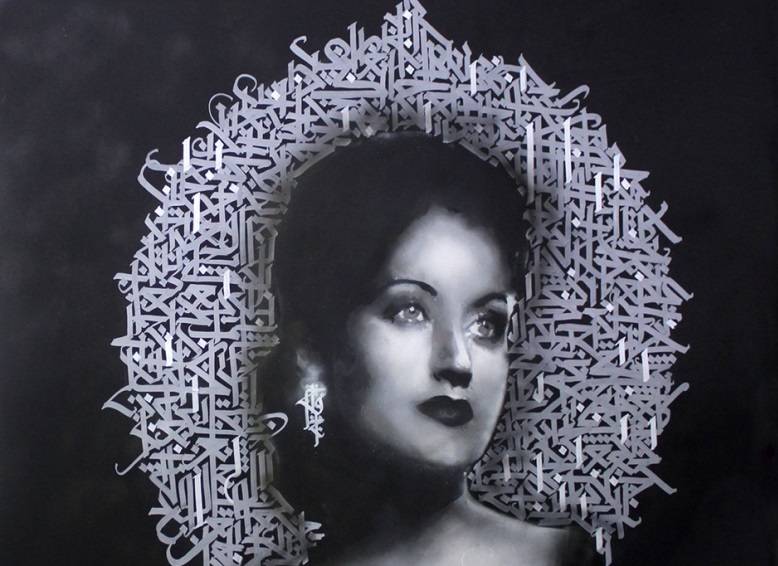
Moussem Cities festival celebrates the Beirut arts scene
"I believe that art is capable of constructing a shared identity for the future," asserts Mohamed Ikoubaân, director of the Moussem Nomadic Arts Centre, which recently set up shop in Brussels after fifteen years of loyal service to Antwerp. Established early in the new millennium to promote Moroccan culture and art, Moussem (a term that refers to major festivities connected with harvest time and with religious celebrations in the Maghreb) has gradually expanded its mission to take in the whole Arab world.
"We could have put a lot of effort into establishing an Arab cultural centre or an institute of the Arab world, but for us it was important to see this art flourish within existing cultural and artistic institutions," Ikoubaân says. The nomadic centre's move to Brussels is good news, as it means that the Moussem Cities festival, celebrating the contemporary artistic scene of a city of the Arab world, will take place in the capital in future.
Following Tunis in 2016, the spotlight is now turned on Beirut, offering a unique opportunity to see work by a number of committed artists over two weeks (we selected 4 highlights: see below) whose installations, performances, plays, dance, novels, and new music tell us about today's Beirut, without any taboos and with no punches pulled.
Did Brussels need a festival like this one?
MOHAMED IKOUBAÂN: Even though there are lots of things going on already in Brussels in terms of cultural diversity, I think that our nomadic approach, over and above the actual programming, can succeed in making cultural institutions reflect on what stories, which canons, and what kind of artistic scene they want to focus on in a city where 60 percent of the inhabitants come from elsewhere.
We cannot continue to present only the great classics of the European repertoire and pretend that there is a homogeneous Western culture without taking into account the additional communities that have arrived here. We need to create a shared identity and art can help us do that.
Moussem Cities is, above all, an ode to the city?
IKOUBAÂN: In choosing the theme of the city, we wanted to take on orientalism and a number of exotic prejudices that give an outdated picture of the Arab world. The Arab cities, too, are contemporary and modern. The city has always been a laboratory, a cradle of creativity. So our approach has been to make the cultures of the Arab world known through its cities and to make a city known through its artists.
Beirut is well known for its flourishing contemporary arts scene. Was it an obvious choice?
IKOUBAÂN: Beirut has become a major centre for experimentation in contemporary arts. Despite the complete lack of support from the government, the Lebanese arts scene is in a ferment that transcends the country's boundaries. Of necessity, artists are going to draw their inspiration from the sad past and complex reality of the history of Lebanon and the region around it.
The artists you have programmed, for the most part, have a message to convey.
IKOUBAÂN: Yes, and that's not unique to Beirut. In our programming, we will tend to focus on artists who have something to say about the city and about society in general. Lucien Bourjeily, Hanane Hajj Ali, and Hatem el-Imam are progressive, committed artists who have had to struggle with censorship.
What about funding?
IKOUBAÂN: Contemporary artists are independent, because there is no political support at all. Financial assistance mainly comes from private sources, especially from foreign institutions such as the Alliance Française or the Ford Foundation, which have a strong presence all over the Arab world. That colonial heritage raises other issues.
Lebanon is known for its political and religious divisions. We sense that there is a will on the part of artists to transcend that fragmentation.
IKOUBAÂN: Yes, that's true. I believe that it's the role of the artist to look beyond the sectarian divisions of the Lebanese system. To take a position while throwing light on the problem, rather than standing up for a community. The victims of a war are all victims, whatever their religion, and that humanism finds expression in art, thankfully.
> Moussem Cities: Beirut. 02/02 > 18/02, various locations, Brussels
(Continue reading below the picture)
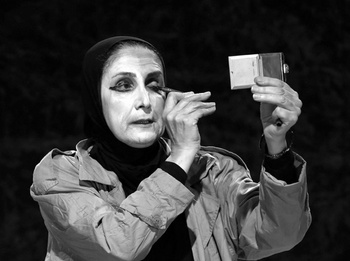
© Hanane Hajj Ali
HANANE HAJJ ALI
Hanane Hajj Ali, an actress whose career began over 30 years ago, has decided she is never going to give in to censorship again. Her latest work, Jogging, was given a preview performance in a Beirut auditorium last October, illegally, at a gathering held in support of freedom of expression. "As artists, we are much less free than before. When the civil war [1975–1990] was at its height, a censorship law was enacted to prevent the stirring up of sectarian conflict. Today, that law is illegal."
Hanane Hajj Ali believes she has the right to talk about anything and especially about subjects that annoy people. Sex, religion, politics: nothing is immune. As an actress, she deliberately sets out to break the taboos of Lebanese society. Hanane Hajj Ali has no qualms, either, about talking about herself, even in relation to the most intimate matters. "In Jogging, it's the artist, the mother, and the citizen who speaks. When I go for my daily jog, I rediscover my city in constant mutation, always being destroyed and rebuilt, while at the same time I rediscover myself, my dreams of playing Medea, for example."
Pursuing those thoughts, Hanane Hajj Ali wonders about today's Medeas, women who have deliberately killed their children. Apart from artistic dreams, there are also erotic dreams. It is impossible to pigeonhole Hanane Hajj Ali when you see her onstage, wearing the veil and turning somersaults as she talks about her sexual fantasies.
"I hope that the Brussels audience will see an aspect of the eastern woman, the woman actress, and the veiled woman, that it has never known. I hope to give it food for thought. I choose to wear the veil because I think it is beautiful. To me, it has nothing to do with a religious obligation."
> Jogging. 10/02, 20.00, Bozar, Brussels
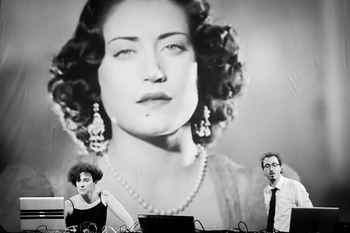
RAYES BEK AND RANDA MIRZA
Love and Revenge was to be the last film featuring Asmahan, an iconic figure of Arab popular song and the star of Egyptian musical comedy in the 1940s, admired and envied for her sublime beauty and her melancholy eyes. On 14 July 1944, the car she was in sank to the bottom of the Nile. Her highly suspicious death remains a mystery to this day.
Taking the emblematic figure of Asmahan as their starting point, the singer and composer Rayess Bek and the visual artist Randa Mira have adapted the Arab musical comedies of the last century to modern tastes as they pay tribute to the men and women who made Middle Eastern music famous all over the world: Fairouz, Oum Kalthoum, Abdel Halim Hafez, Sabah, and others.
"It was truly great music: from an artistic point of view, it was wonderful," explains Rayess Bek. "Sure, there is some nostalgia behind Love and Revenge, but that wasn't our primary motivation. Over and beyond the idea of a lost golden age, we wanted to look into what has happened since then. We wanted the audience to discover or rediscover those artists." While Bek remixes old hits from the 1950s to the 1980s, adding electro beats, Randa Mirza remixes extracts from musical comedies.
The duo is accompanied by two live musicians playing traditional instruments. "The result is very pop and also makes you want to get up and dance." Love and Revenge is also a tribute to a certain image of the women of the Arab world. "Many of those singers and actresses expressed themselves very freely. There is something about them that is really magnificent and very glamorous. They symbolise an Arab world that we don't know any more and that, sadly, is disappearing as every day goes by."
> Love and Revenge. 18/02, 20.00, De Vaartkapoen, Molenbeek
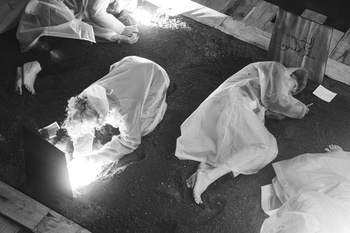
TANIA EL KHOURY
Moved, in the early days of the revolution by images of Syrian women digging the graves of their sons in their own gardens, Tania El Khoury decided to investigate. "It started as a political interest. I wanted to know why this was happening. So I started asking journalists first and activists who were living there. And then, from what I was discovering, I became more and more involved in the stories and started doing interviews with Syrian refugees in Lebanon."
In her sound installation Gardens Speak, El Khoury invites ten participants to listen to the stories of ten civilians killed during the revolution. Refusing to pledge allegiance to the regime of Bashar al-Assad, many families turn down official burials for their dead and decide to bury them in their own gardens. "I wanted to talk about ordinary people who were killed by the regime: it's not only about the activists, some of these people were just passing by and were killed."
Painstakingly, Tania El Khoury has reconstructed the true story of each of the individuals in her installation through interviews with their families and friends. Gardens Speak also tells us about the bonds between the dead and the living. Those who remain take on the responsibility of keeping alive the memory of those who are gone. The dead protect the living from the horrors of the regime.
Gardens Speak has been translated into several languages and has been presented throughout Europe and the Arab world. "I have noticed that its reception does not vary much from one country to another, because mourning, death, and justice are international themes that affect all of us. Each person can identify with it in a particular way. It was very emotional when it was shown in Beirut and in Cairo because a lot of Syrians came to see us."
> Gardens Speak. 03/02 > 10/02, Kaaistudio's, Brussels
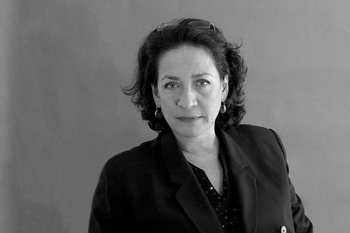
© Hoda Barakat
HODA BARAKAT
More Lebanese live outside their country than in it. The civil war, obviously, is one reason for that. The writer Hoda Barakat, who writes novels, stories, and plays, is one of those exiles. Although France is her adopted home, the fact that all her novels are set in Lebanon shows that her heart has never left her homeland.
"Right now, I'm writing a book that is set elsewhere, but I can't help it: in some way or another it is as if the characters know Lebanon and have walked the city streets." In her novels, Barakat presents characters, often male, who live on the margins of society. In the background, history takes place – the violent, brutal history of the civil war. As in The Stone of Laughter (1996), her first book, in which she tells the story of Khalil, a young gay man who refuses to take part in the fighting and locks himself away in his room until the conflict catches up with him.
In The Tiller of Waters (2001), Nicolas, who has lost his parents and his mistress in the war, takes refuge in the basement of the family shop and broods on his memories. "It is as if I had an insistent, worrying voice in my head that wants me to tell his story," she says. Her use of the Arabic language is also central to her creative process as a writer. "Arabic is the language of the world I write about, and the language of my characters. I physically need the sounds of the language, especially its guttural sounds."
Barakat, whose novels have been translated into several languages, has a special relationship with the art of translation: "I work as far as possible with translators who share my literary sensibility." Her last novel The Kingdom of This Earth (2012) has recently been translated into Dutch. During her eight-week residency at Passa Porta, she will be talking with Arabic-Dutch translators.
> Writers from Beirut: Hoda Barakat, Iman Humaydan, Elias Khoury. 09/02, 20.00, Bozar, Brussels
Read more about: Cultuurnieuws, Events & Festivals
Fijn dat je wil reageren. Wie reageert, gaat akkoord met onze huisregels. Hoe reageren via Disqus? Een woordje uitleg.